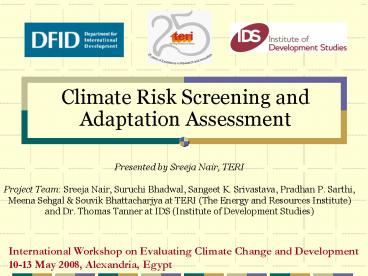Climate Risk Screening and Adaptation Assessment - PowerPoint PPT Presentation
1 / 11
Title:
Climate Risk Screening and Adaptation Assessment
Description:
International Workshop on Evaluating Climate Change and Development ... Adverse impacts on natural ecosystems (forests, coral reefs, mountainous regions etc. ... – PowerPoint PPT presentation
Number of Views:75
Avg rating:3.0/5.0
Title: Climate Risk Screening and Adaptation Assessment
1
- Climate Risk Screening and Adaptation Assessment
Presented by Sreeja Nair, TERI Project Team
Sreeja Nair, Suruchi Bhadwal, Sangeet K.
Srivastava, Pradhan P. Sarthi, Meena Sehgal
Souvik Bhattacharjya at TERI (The Energy and
Resources Institute) and Dr. Thomas Tanner at IDS
(Institute of Development Studies)
International Workshop on Evaluating Climate
Change and Development 10-13 May 2008,
Alexandria, Egypt
2
Presentation outline
- Vulnerability concepts and assessment
- India in context
- The climate-risk screening process
- Knowledge gaps and future research needs
3
Vulnerability Concept and assessment
- Vulnerability f Exposure, Sensitivity, Adaptive
capacity - Differential vulnerabilities exist across
different systems based on inherent response
abilities - Both human and natural systems are affected
- Reduced capacities for effective response in
developing nations - Climate change an additional and multi-pronged
stressor
4
Determinants of vulnerabilityAssessment of
vulnerability of Indian agriculture to double
exposure (climate change and globalization)- a
case study
Source TERI, 2003
5
- Regions with highest climate sensitivity and
exposure are not necessarily the most vulnerable
Source TERI, 2003
6
Major threats due to climate change Indian
context
- Reduction in freshwater availability, glacial
recession - Impacts on agriculture, livelihood and food
security - Adverse impacts on natural ecosystems (forests,
coral reefs, mountainous regions etc.) - Coastal regions at risk due to sea level rise,
storm surges etc. - Human health due to changes in virulence and
disease patterns and, - Risk to infrastructure
Source GoI, 2004
7
The ORCHID Process
- Climate science
- Vulnerability
- Economic impacts
Selects high risk projects
8
Screening of projects
- Criteria for climate risk screening comparison
of scenarios - No programme scenario without interventions
- Programme scenario partial risk reduction due to
programme implementation - Programme plus scenario risk reduction with
additional components added within the present
programme portfolio
9
Climate- risk screening and adaptation assessment
Key Questions
- Have the climate risk assessment approach and the
multi criteria analysis led to a range of
credible adaptation options? - How does the analysis inform our understanding of
adaptation to longer term climate change? - What do we learn from the cost benefit analysis,
and is it appropriate for adaptation decision
making?
10
Knowledge gaps and future research needs
- Need for systematic review in order to scale
impacts uniformly across various studies - It will also help in assessing the underlying
uncertainties - Need to facilitate integration of climate-risk
screening results in programme design and
implementation. - Need for integrated vulnerability assessments to
identify suitable win-win adaptation measures - Identify links with the existing policies and
building scope for enhancing, modifying,
strengthening in the light of unanticipated
changes in the climate - State and local level policies- essential to
reflect ground conditions, interest and
aspirations - Successful examples can be custom-tailored and
replicated elsewhere- role of experience sharing
and learning by doing (Folke et al, 2002
Moench and Dixit, 2004)
11
Thank You






























